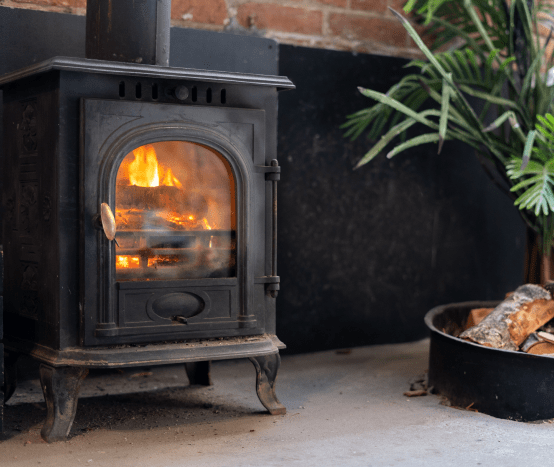Woodburning information
Lewisham is a smoke control area, and it is an offence to emit smoke from a chimney anywhere in the borough. Breaking smoke control area rules can lead to a fine of up to £1,000 for the occupier of the property.
Overview
In smoke control areas it is only legal to burn certain “smokeless” or “authorised” fuels or to use an appliance that has been granted an exemption by the Department for Environment, Food and Rural Affairs (Defra). A Defra exempt appliance must only be used with the type of fuel permitted by Defra for that appliance.
An example of a Defra exempt appliance might be a modern, EcoDesign or ClearSkies certified wood-burning stove. Open fireplaces (hearths) and older stoves are not exempt, and it is illegal to burn anything other than a “smokeless” or “authorised” fuel.
Fuels allowed in an open fireplace are:
- anthracite
- semi-anthracite
- gas
- low volatile steam coal
- authorised fuels
Fuels NOT allowed in an open fireplace are:
- wood - except in exempt appliances that list wood as their permitted fuel
- house coal
Even if a “smokeless” or “authorised” fuel is used, or a Defra exempt appliance is used, it is still an offence to emit smoke from a chimney and this can lead to a fine of up to £300.
The penalty for breaking the smoke control area rules by obtaining unauthorised fuels to use in a non-exempt appliance is a fine of up to £1,000.
Burning wood and other solid fuels always produces health-damaging air pollution, even if no visible smoke is present. The best way to help improve local air quality and protect everyone’s health is to avoid burning solid fuels at home, wherever an alternative form of electric or gas heating is available.
Why do these rules exist?
Air pollution in Lewisham exceeds the World Health Organization’s guideline levels. Burning wood, coal and other solid fuels at home emits dangerous pollution known as fine particulate matter (often referred to as PM2.5), which has been classified by the World Health Organization as a carcinogen and can cause asthma, heart disease and other serious illnesses affecting our lungs, hearts, and brains. Exposure to particulate air pollution can also trigger the symptoms of existing health conditions like asthma or heart disease.
Domestic wood burning contributes 17% of London’s PM2.5 air pollution, and current evidence suggests there is no safe level of exposure to this pollutant. For more information, visit the London Woodburning website.
For advice regarding cost-of-living support, please look at the resources. If you cannot access the online resources call 020 8314 6000 or call Citizens Advice on 0800 144 8848.
If you see smoke coming from a chimney in Lewisham, please report this on the Lewisham Council website.
Bonfires within Lewisham
Lewisham actively discourages all bonfires within the borough. If you have waste you need to dispose of, you can do so through the Council recycling sites. Look at our rubbish and recycling pages for advice on how to dispose of waste in other ways.
Reporting a bonfire to the Council
Any bonfire that causes a nuisance or is believed to be an act of antisocial behaviour should be reported to the Safer Communities Service using the online form, on Noise and other disturbances we investigate.
When making a complaint, please provide your details and the address of the property causing the nuisance. This will enable us to investigate your complaint.
It is important to note that under the Environmental Protection Act 1990 regulations, creating a statutory nuisance is deemed an offence.
If a bonfire is determined to meet the evidential standards of a statutory nuisance, the individuals responsible for creating it will be served with an abatement notice.
Complying with the notice is of the utmost importance, as non-compliance may lead to the issuance of a Fixed Penalty Notice or legal action by the council. Prompt action is recommended to ensure compliance and avoid any unnecessary consequences.
If a nuisance emanates from industrial, trade, or business premises, a fixed penalty notice (FPN) may be issued to members of the public for a fee of £400. In the case of a nuisance at private premises, an FPN may be issued for a fee of £150.
